
I’ve heard it debated throughout the industry, and so have you.
Is what the radio broadcasting business is going through right now a result of evolutionary change, powered by increasing conditional challenges and emerging technological threats? Or is this a larger and more perilous existential crisis facing the industry where the outcome is not a foregone conclusion? That is, radio may not survive just because it’s been around for a long time or because 80-something-percent of adults still tune in every week.
So which is it? And why does it matter?
Well, if it’s the former, a challenge that originates largely from new, outside technological changes – like streaming, podcasts, and AI – radio’s ability to adapt is very much in-play as it uses these advancements to create its own products and services that leverage these new tools. For example, smartphone and mobile apps came along, and broadcasters developed applications of their own, assuring they’d have presence on mobile phones and tablets, as well as on platforms such as Apple CarPlay. This scenario is challenging, to be sure, but ultimately solvable. Radio may not go back to being what it once was, but it survives.
But then there’s the other scenario where radio fails to recover from its post-pandemic downturn, a continuation of a trend that’s now a couple decades old. And now we know, digital usage of entertainment and information has now surpassed “linear,” and it’s never going back. Meanwhile, the competition continues to proliferate, bolstered by smart young minds and plenty of capital to support its development. And broadcasters are simultaneously confronted with diminishing resources – human and financial – as they try to muster up a response to a continuing loss of share and relevance.
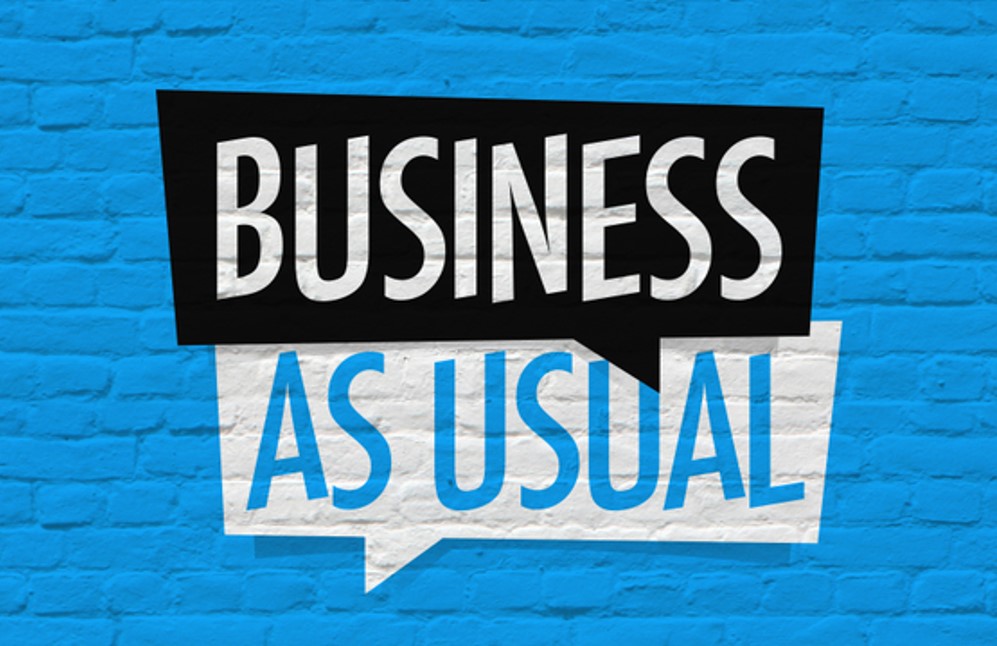 No matter how you interpret the current state of play, it becomes obvious that a “business as usual” mindset not only won’t get it done, but that it’s an accelerant to radio’s impending doom. While many broadcasters continue to embrace the status quo, even in this highly flammable environment, it should be clear to even the most stubborn of operators that the industry’s “good enough” standard of mediocrity is no longer good enough (if indeed it ever was).
No matter how you interpret the current state of play, it becomes obvious that a “business as usual” mindset not only won’t get it done, but that it’s an accelerant to radio’s impending doom. While many broadcasters continue to embrace the status quo, even in this highly flammable environment, it should be clear to even the most stubborn of operators that the industry’s “good enough” standard of mediocrity is no longer good enough (if indeed it ever was).
Radio can no longer operate on a philosophy hinged on scarcity. That’s because entertainment and information options are plentiful and of generally solid quality. While Spotify, SiriusXM, and the majority of podcasts are just OK, they provide variety and choice in a world where radio once ruled, often because it was the only game in town. Or in your dashboard.
Not so today – or ever again.
A deep dive into what makes radio unique, habit-forming, and local (still a characteristic that sets the medium apart) reveals the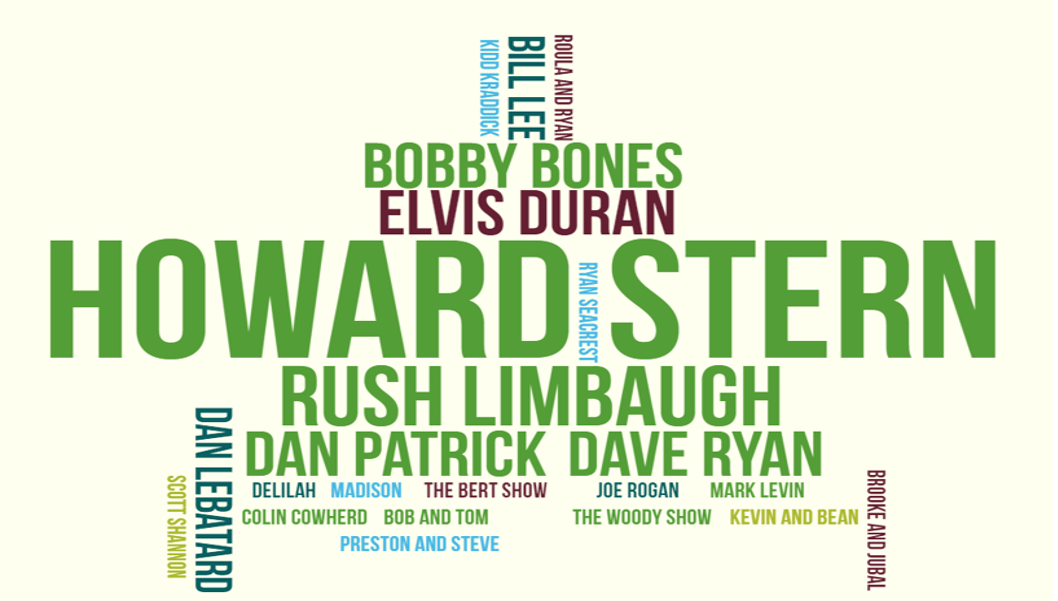 not-so-secret sauce that has distinguished the industry for decades, from Wolfman Jack to Paul Harvey to Howard Stern. Personality is, was, and likely will be the elixir that keeps consumers, advertisers, and marketers coming back for more. Or coming in the first place. And if the radio broadcasting industry doesn’t develop a system that not only perpetuates and maintains its current crop of stars, but also builds mechanisms for discovering and recruiting future talent, it is indeed screwed.
not-so-secret sauce that has distinguished the industry for decades, from Wolfman Jack to Paul Harvey to Howard Stern. Personality is, was, and likely will be the elixir that keeps consumers, advertisers, and marketers coming back for more. Or coming in the first place. And if the radio broadcasting industry doesn’t develop a system that not only perpetuates and maintains its current crop of stars, but also builds mechanisms for discovering and recruiting future talent, it is indeed screwed.
Six years ago, we watched personalities pass music on the “Why radio?” measure that is an annual query to measure the medium’s potency and why it continues to resonate, particularly among its fans. Nothing has changed since, and while the purge of personality has no doubt dampened listener enthusiasm for a station or radio overall, it is the human voice flowing out of your speaker that distinguishes local radio from its many challengers.
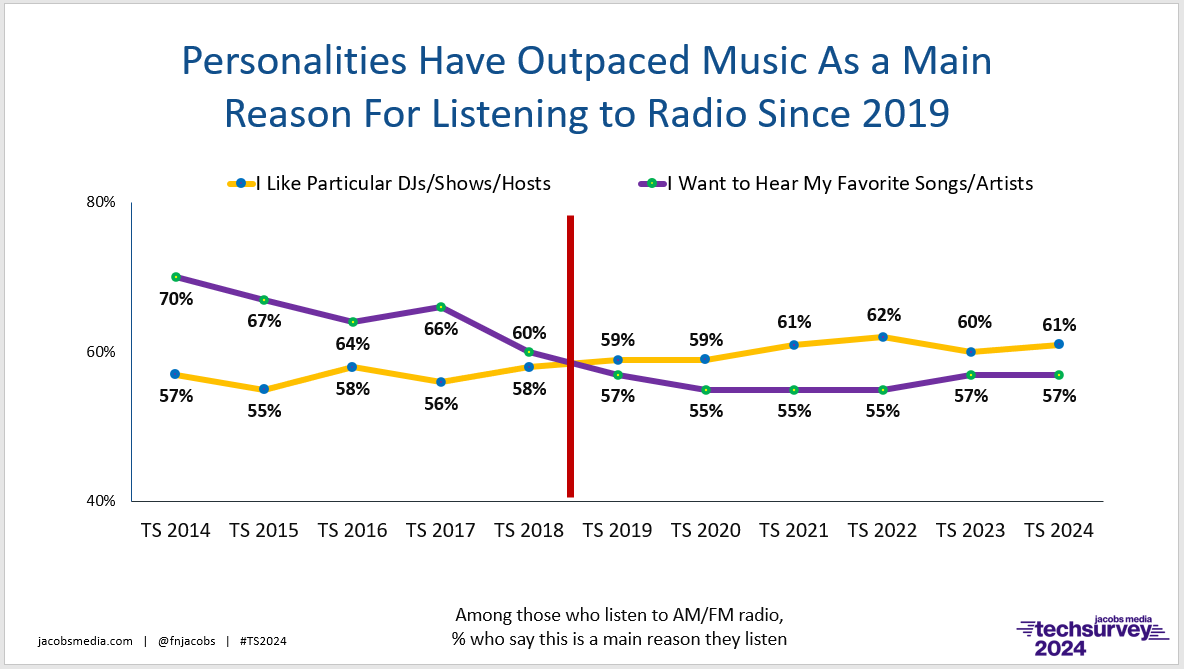
This may be an oldie as Techsurvey charts go, but it may be the most important slide in the deck. It very well could be the king of radio’s KPIs – its key performance indicators. If I was a Wall Street analyst trying to determine whether radio companies had the goods to compete, much less excel, I’d develop a formula of personality discovery and development. OK, PD&D. And no, running syndicated shows don’t count because broadcasters who go to that dance too many times are abdicating their future to someone else’s idea of what’s new and what’s good. After all, what actual spade work are the syndicators doing to further their stable or the dayparts of broadcasters too lame or too lazy to develop talent of their own?
Something else to note: the personality line isn’t growing, and in fact it has flattened. That would be an indication to this researcher that while personalities may have more intrinsic value than music, the radio broadcasting industry isn’t moving at a quick and effective enough pace to keep up. The “gap” between music and personalities should be growing, but alas, it is not. And while radio operators cannot control the music they have to play, they have more than a little something to say about who’s hosting their morning drive show or whether there’s any live talent on during the weekend.
What you see on this chart is no accident nor is it coincidence. Music has long been a commodity, going back to iPods and Napster. It is available everywhere on more and more brands, some of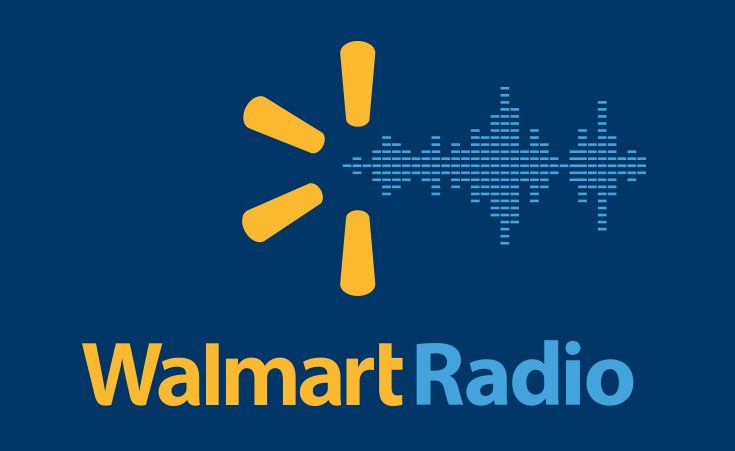 which are head scratchers. Aside from the number of similar services trying to knock off or diminish Spotify – Amazon Music, Apple Music, etc. – more and more retailers are launching in-store streaming “radio stations” that play music while delivering advertising messages to customers already in the act of walking up and down the aisles and shopping. From Walmart to now Chick-fil-A, we can now hear their “unique playlists” blaring “Life is a Highway,” “Uptown Funk,” and “September” in between commercial messages from their vendors that remind us there are specials on laundry detergent or combo meals.
which are head scratchers. Aside from the number of similar services trying to knock off or diminish Spotify – Amazon Music, Apple Music, etc. – more and more retailers are launching in-store streaming “radio stations” that play music while delivering advertising messages to customers already in the act of walking up and down the aisles and shopping. From Walmart to now Chick-fil-A, we can now hear their “unique playlists” blaring “Life is a Highway,” “Uptown Funk,” and “September” in between commercial messages from their vendors that remind us there are specials on laundry detergent or combo meals.
Thanks to music being “everywhere,” consumers no longer have to call a radio station for a request and then wait around to hear it fulfilled (or not). And if they want to repeat a song or shuffle the order of a playlist, they can – with the touch of a button. Or skip a song, fast-forward through the guitar solo, or finally see those garbled lyrics. Technology hasn’t just caught up with radio’s music delivery capabilities, it has blown past the broadcast standard.
Amidst the cacophony of audio choices, radio stands somewhat alone, thanks to its personality component and its ability to be live and in-the-moment. Yet, in recent years, the friendly voices behind the mic are just as likely – if not more so – to be targeted for those now regularly scheduled RIFs that attempt to deliver a profitable product to Wall Street, while stripping stations and their companies of the soul they sorely need to retain if they are to avoid oblivion. Live radio is being systematically replaced by prerecorded versions that have never successfully replaced how it feels to hear a live broadcast. Personality matters to radio – maybe now, more than ever – whether radio’s powers-that-be have reached the same conclusion.
This is why Don Anthony and Jacobs Media launched the AQ research studies of commercial radio air talent back in 2018. As counter-intuitive as it sounds, the idea behind this initiative was to give radio’s air personalities a voice. Amidst a rapidly changing environment, where do our DJs and hosts stand? How are they coping with the changes in their milieus – the station or now, their home studios – and what’s their future outlook? How do they see their careers faring in today’s radio industry, and what are they doing to retain a sense of control over their personal brands and their careers?
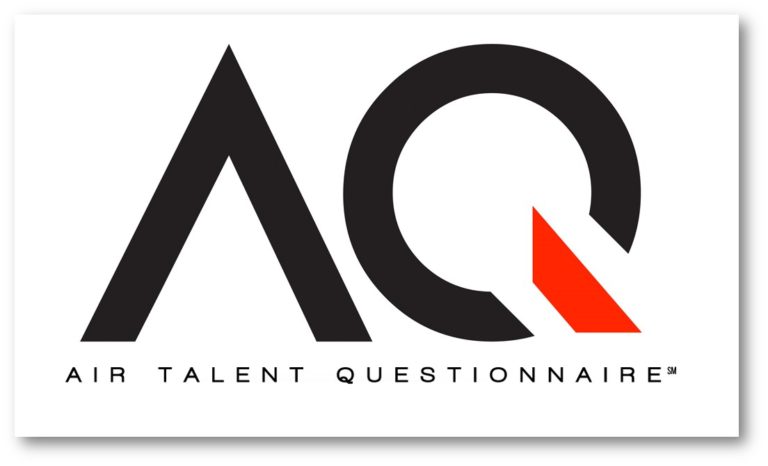 The results of these studies have been eye-opening, to say the least. While we’ve also had a little levity determining whether DJs neurologically share “the dead air dream” (they do) or which is the “bathroom song” of choice (the winner is Peter Frampton’s “Do You Feel Like We Do?” live), the majority of our questions and their responses have been as serious as a heart attack.
The results of these studies have been eye-opening, to say the least. While we’ve also had a little levity determining whether DJs neurologically share “the dead air dream” (they do) or which is the “bathroom song” of choice (the winner is Peter Frampton’s “Do You Feel Like We Do?” live), the majority of our questions and their responses have been as serious as a heart attack.
And as I prepare to present the findings tomorrow afternoon in a free webinar (and you’re invited), I continue to see data from radio’s air personalities that merit more attention than owners and operators often pay. Talent is not a commodity easily traded in a mutual fund – it’s a precious resource that needs to be identified, recruited, coached, nurtured, grown, developed, and marketed. And because personalities at their core are intuitive and creative, they are often high-maintenance, reeking with both too much confidence and too little sense of security.
The results of this year’s study continues some of the disturbing trends we’ve now watched over the last half dozen years. Certainly since the pandemic, relations between talent ownership have been strained. Many behind the mic are critical of the companies they work for, often feeling taken for granted. While many still have passion for radio, most question whether they will finish their careers in radio. And more and more are either forced into taking second jobs out of need or they are proactively trying to build a more secure future outside of their rickety day jobs.
The data tell an important story about how radio as an industry is moving, and how its on-air talent are navigating these changes. The following are a series of charts that form this narrative of concern for how media companies will be challenged to maintain their talent foundations moving forward.
Below are three data points that go to the collective mindset of talent in 2024. Strong majorities feel taken for granted, are stressed, and worry about more RIFs. Since the study was fielded in July, there have been several air staff purges, including some that took place while many were communing at Boot Camp in San Diego last month.
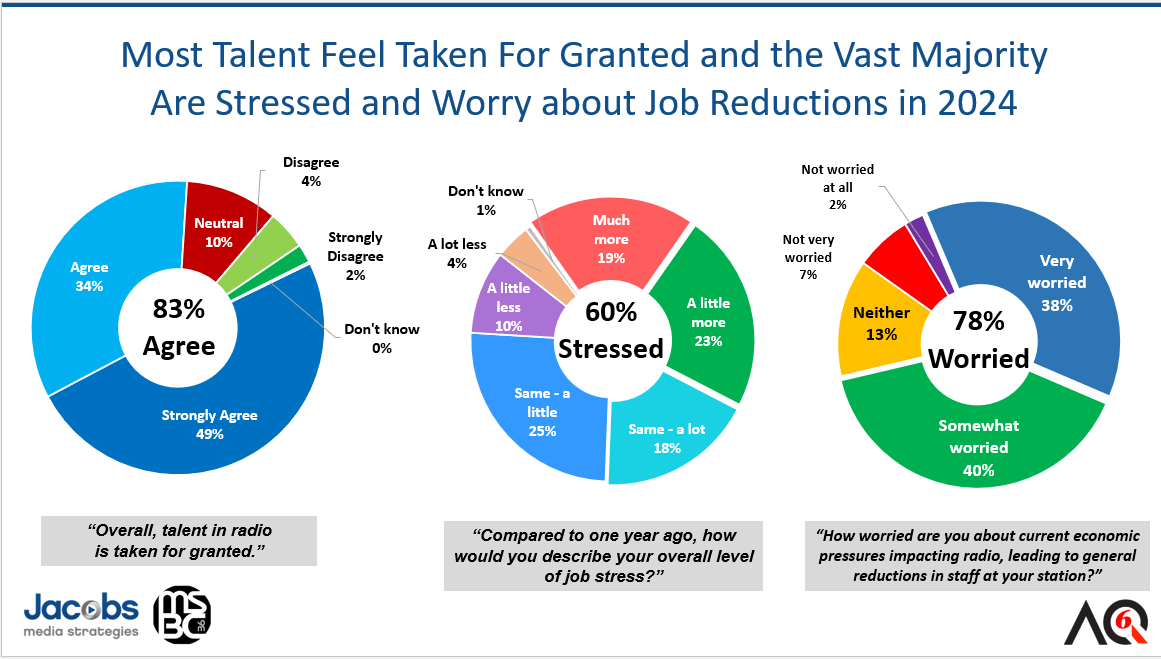
I believe all three of these lay the shaky groundwork for a suboptimal set of conditions that amp up talent’s angst, making what was already a highly difficult job that much more arduous. Unlike the rest of us, talent is asked to leave their cares, pressures, and problems behind because when that mic is switched “on,” they’re tasked with making us laugh, feel better, or more informed. Whether they’re on the air on commercial, public, or Christian radio stations, that’s the mission. Whether the Twin Towers are coming down, a tornado is blowing through town, or the world is closed due to a pandemic, they’re the (radio) faces of their stations, always putting their best foot forward, come hell, high water, or rapidly spreading viruses.
And in facing an uncertain future, more than four in ten feel radio has fallen short in technical training. As innovation has emerged and spiraled, the prevailing feeling is their companies haven’t kept pace. Additionally, a near majority feel radio has not stayed competitive with new media, and well more than half say the efforts their company has made are insufficient in the all-important area of new talent discovery. Add them up, and you’re got a situation where large percentages of radio’s on-air workforce feel the industry simply isn’t competitive:
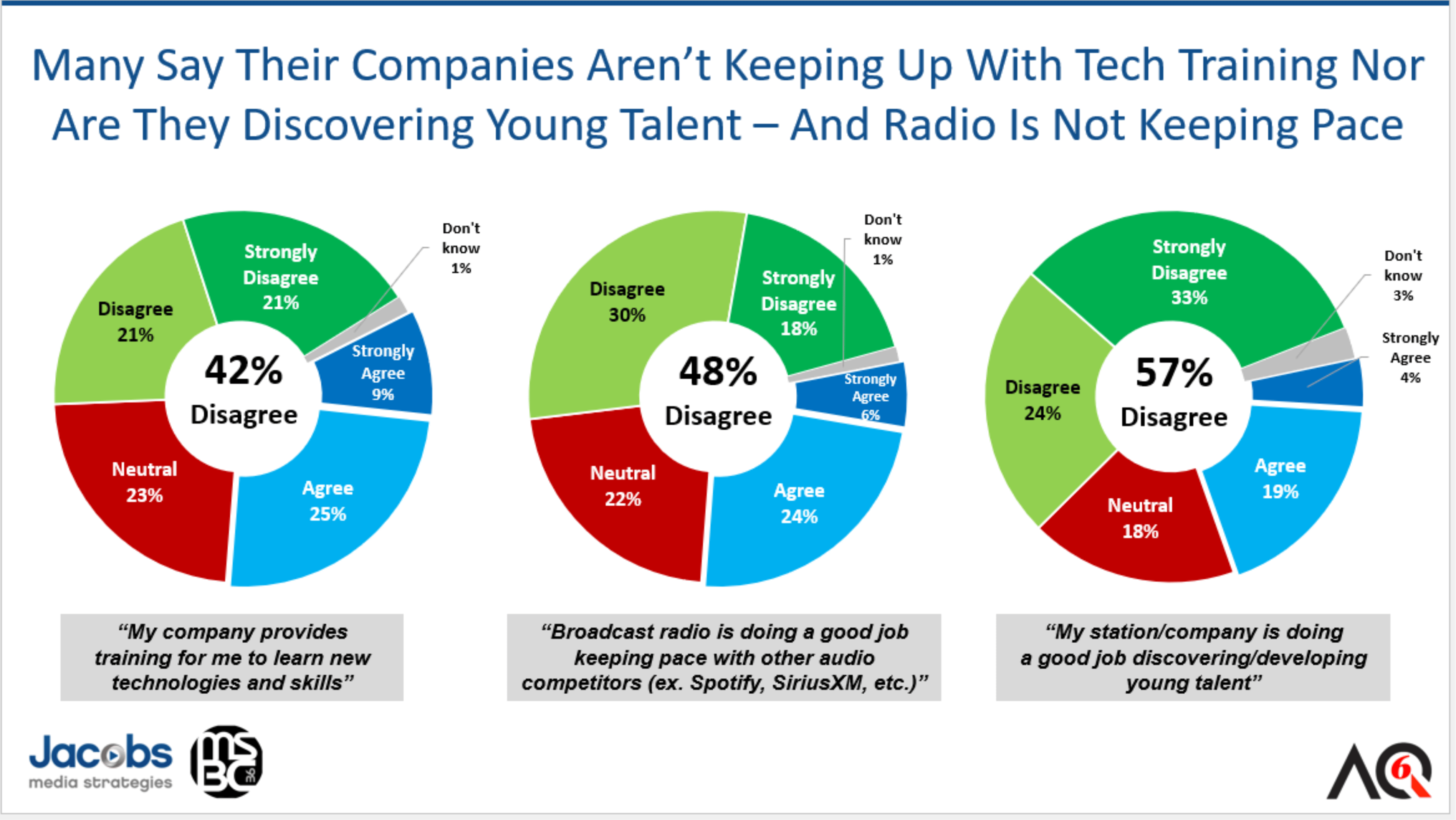
And it’s a mixed bag when personalities think about the future of radio. On the chart below, the pie on the left shows a majority believe radio will hold steady over the next several years, while only 6% see it growing. Sadly, more than four in ten believe broadcast radio will go backwards or find itself in trouble. To that end, a solid majority would not recommend a high school student pursue a career in radio broadcasting, another troubling stat. I’m sorry, but that’s just sad.
And yet, talent in general somehow still have solid passion levels for the business (maybe more so than the people working behind the scenes). More than four in ten say they continue to have “high” passion for radio, while 15% rate it as “the highest” – a remarkable metric that reveals their deep-seated belief in an industry many others have given up on.
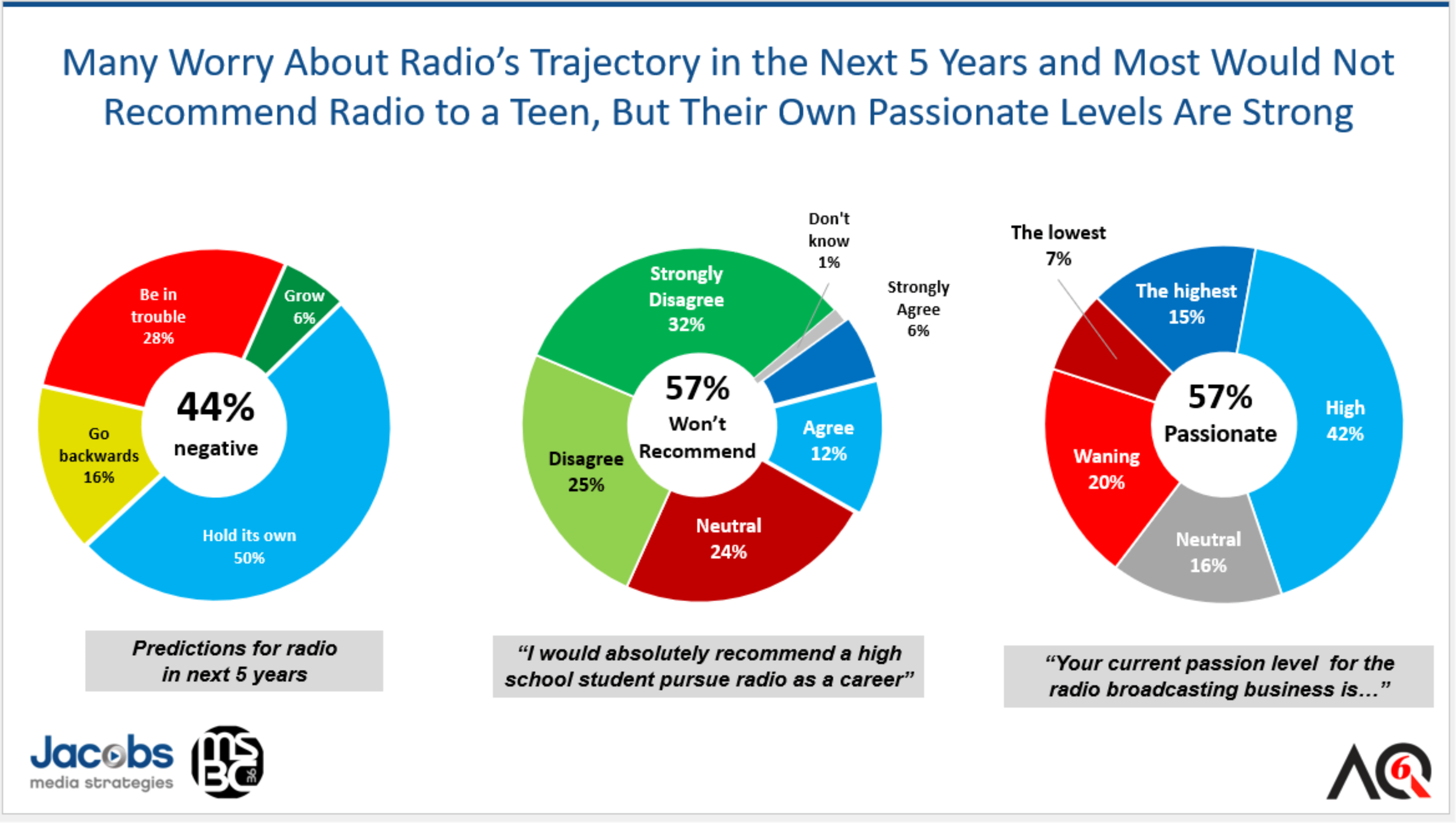
And so it comes down to a familiar set of circumstances: the company you keep. Or perhaps better put, the company that keeps you.
We’ve used the Net Promoter Score benchmark since the launch of our AQ studies in 2018 to track how talent feels about their station(s) and their ownership. In other words, would they recommend their parent companies to a friend or industry colleague?
In the first two pre-pandemic years of our surveys, these numbers were so anemic I didn’t show them at either Boot Camp during those years. I didn’t feel I had enough data to reach the conclusion that most radio companies weren’t making the cut, at least as far as their talent was concerned. But then COVID hit, and the scores actually sank to even lower levels. Today, they have generally not recovered from the ravages of a world crisis the radio industry has not recovered from.
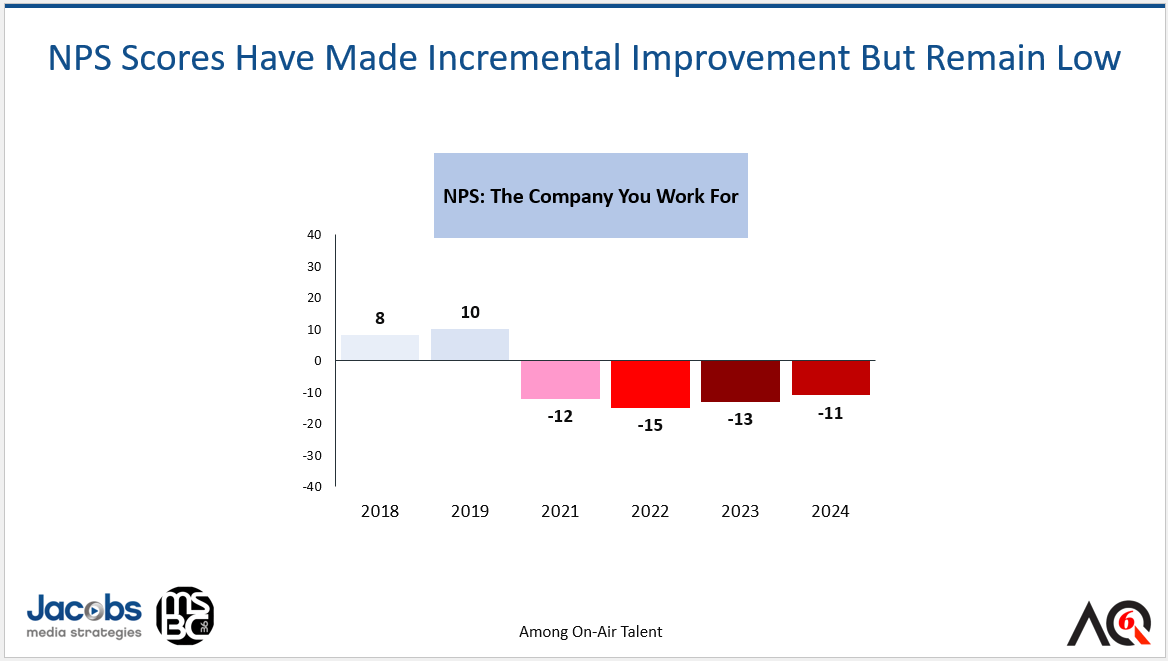
With these scores well below “sea level,” there’s an opportunity for a company or two to step up and fill the vacuum. Back in the day, there were radio companies broadcasters aspired to work for. There’s no reason why there couldn’t be again.
So, this is just one story from AQ6. As you might imagine, there’s lots of data here that deliver a powerful message from radio’s MVPs. I’ve got a lot more stories to share with you from the spreadsheets of AQ6. I can’t guarantee they all have happy endings. But no matter your role in radio, whether you’re rank-and-file, in the executive suite, or behind the mic, you ought to know what the industry’s on-air elite are thinking and hoping.
There’s still time for you to join me tomorrow for our free AQ6 webinar where I’ll break down the key findings from this year’s study. Bring the staff – the salespeople, upper management, the talent (of course) and hopefully, even some members of the owner class. There’s a lot to learn about how radio’s talent sees the world.
And maybe, just maybe, the experience leads to conversations about where it’s been, and importantly, where it could go. As data goes, this stuff may be more important than knowing that song’s M Score or whether your “station plays too many bad songs along with the good ones.”
Radio’s ability to survive, much less thrive, may depend on how its personalities figure into it ongoing success or impending doom.
Stand by.
Join us for our free webinar Wednesday, September 4h at 2pm ET. Register here.
- What If Radio Tried Something Right Out Of Left Field? - May 9, 2025
- Why Radio PDs Are A Lot Like NBA Coaches - May 8, 2025
- Memo To Radio: We Have Met The Enemy And It Is… - May 7, 2025




Amen!! Without great talent, radio is just another music option… and a poor one, at that (for the most part). My concern is not only for elimination of live, local talent, but the lack of weekend & overnight shifts where new talent can hone their craft. College radio helps, but involvement & engagement in that is a whole other topic.
Local talent and immediate on air response to emergencies & major artist deaths are a no-brainer to me. Owners need to see the big picture. Thanks, Fred.
Losing our minor leagues (nights, overniights, weekend) has take its toll on the overall quality of air talent nationwide. And when you pull the plug on content and voicetrack or just run drops in between songs, the self-fulfillling prophecy takes over. Your ratings sucks, and yet, there’s no incentive to invest any money into these dayparts. After all, no one’s listening.
HD would have been the perfect talent development opportunity. Here’s to a new successful sesaon. Radio has punch, profit, content and connection.
A sobering assessment for owners and those they employ .Hopefully you will have a huge audience for your presentation.
HD is still there, Clark. Problem is, no one thinks they’ll get a good ROI from this.
Fred,
As usual you manage to take on difficult topics with thoughtful analysis. Here in Boston the timing is just awful for this as local talent has been eliminated on WBOS, music bumped in order to bring in Bloomberg Business. Especially ironic given parent company Beasley’s performance. I’ve just spent some time reading up on them on Stock Analysis.
These corporate radio owners have long ago abandoned talent, and as Adam 12 says his goodbyes today yet another rock radio station is gone – turned into a mix of syndicated out-of-town noise and jukebox delivery.
WZLX is all alone in the end zone now, and as your article implies, each day talent anticipates the corporate email…..
Tai, back in the day – and you remember this well – there were a dozen Boston stations (maybe even more) that had solid-to-great talent on around the clock. The marketplace (and the radio economy) made it possible for most stations in a major markket to make a living. Those in the top quartile could make a fortune. Sadly, those days are in the past. I appreciate the kind words.
Bless you, Fred, for once again removing any shred of plausible deniability from those who are driving radio into a grave.
And yet hope springs eternal.
Hope so, John, hope so.
Listening to the WLS/WCFL rewind over the weekend only emphasizes your point.
2 or 3 songs and then 2 (maybe 3) minutes of commercials was more listenable than the product today. There was a flow to the programming.
The DJ’s were talking about what was going on in the community, even if it was just the time, temperature and here is name of song on Super CFL. It’s not much different than what is going on at a Chicken World.
I still think there is a market for it out there.
Part of the problem, Jerry is that the PPM world rewards stations for minimizing the stopsets to 2 an hour. Time was we’d take the 12 spots and split them into 3-or 4 breaks in the hour. They were tolerable and not as annoying as the 16-18 units in a given stopset. Part of the solution is to let the listener feel if they go away, they’ll miss something. (Great song, great bit, great contest) – almost no one is doing that these days. I hear stations running promos on how great their music is -followed by 6 minutes of commercials. Most stations run more breaks with their “imaging” voice than with the “personality” who’s hosting the show. Why not let the “jock” deliver those lines with some variety ? That’s just one of the many tips of the ol’ iceberg.Just like one (obvious) religious broadcaster owning over 800 signals being operated from 3 studios, the rules have to change before the answers can be found.
Thank you for the explanation Dave. That explains why the clock is the way it is now. Its been a long time since I flipped open the microphone so I’m just a listener.
Radio is part of the entertainment business. Unfortunately, spreadsheet jockeys and money people who are wizards at the business side of the equation haven’t figured out how to reliably quantify the entertainment side of the business. One of the huge misses of consolidation was the idea that the rubes in smaller markets would be agog at the opportunity to hear big city stars on their local radio stations. The concept completely missed the idea that the majority of people wanted that connection to time and place more than they cared about big city doin’s. Yes, there are exceptions, particularly in talk radio, but music radio can’t compete on music rotations alone. Radio must offer added value that takes local differences and attitudes into account.
I’m a bit torn on this one, Brian. Syndicated shows, in general, have brought polish, professionalism, and consistency to small market radio. But the cost is a lack of localism. Smart operators use great syndicated to get the day going and the cume flowing, followed by strong local talent that give listeneers that all-important sense of place. It is a question of balance.
Fred I missed your free AQ6 webinar, is there anywhere I can watch it?
Thanks, Fred. It’s so critical right now for radio companies to be sensitive to the needs of talent. At a time when podcast publishers like Sirius XM and Wondery are signing 8-figure and 9-figure deals with top creators, you have to wonder what radio operators can do to keep the best talent from turning their focus elsewhere. Could radio offer 360 deals that include podcasts, YouTube, TikTok etc. with revenue sharing? If not now, how could radio companies re-think their business to play in that sandbox?